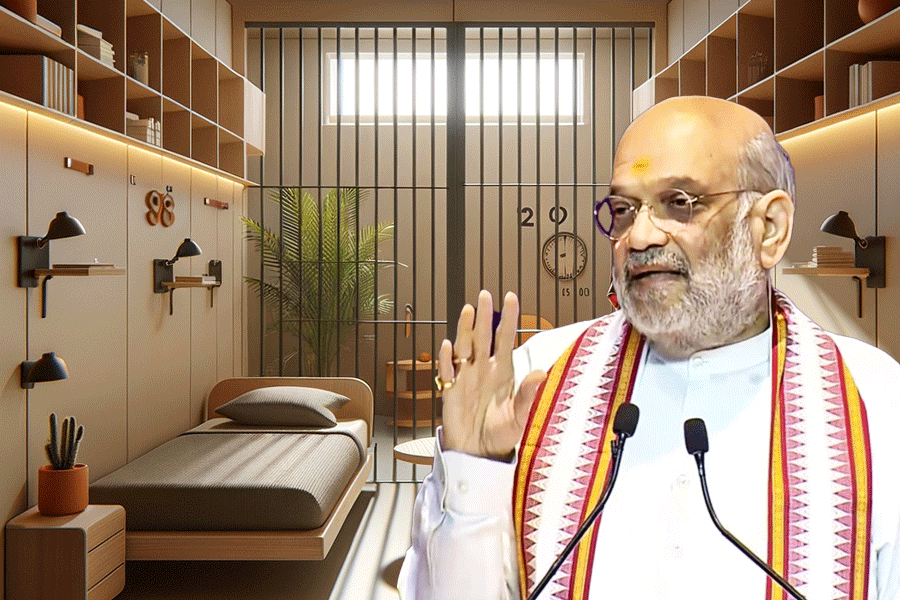There’s a certain irony in trying to make jail sound like a spa. But that’s exactly the kind of paradox India finds staring at after Union home minister Amit Shah’s latest remarks that “each state should build a special prison for fugitives that meets international standards.”
Shah’s aim is to deny India’s most wanted the chance to argue abroad when faced with extradition requests that India’s prisons are unfit for detention.
“Till the time we create fear for the Indian legal system in the minds of fugitives who are hurting our economy, sovereignty, and security from abroad, we cannot ensure the security of the country,” Shah declared on Thursday, inaugurating a CBI conference on extradition challenges.
He also proposed cancelling the passports of fugitives the moment an Interpol Red Notice is issued.
“It’s not difficult with present technologies,” he said, which is probably true if you’ve ever been locked out of your UPI app for forgetting your PIN twice.
But the real question now is — if India’s fugitives get “international-standard” prisons, will they also get coffee makers, PlayStations, and music studios like their European counterparts?
Let’s take a tour of the world’s most desirable jails, the kind that would make even Nirav Modi and Dawood Ibrahim wonder if absconding in style was a poor career choice.
According to the International Security Journal, at Norway’s Bastoy Bay Prison, inmates enjoy fishing, farming, and self-reliance.
The country’s most infamous resident, the terrorist mass murderer Anders Behring Breivik, who killed 77 people in 2011, has complained for years that his confinement is “torture.”
His “torture” involves three personal rooms, access to college classes, a coffee maker, and a PlayStation.
In 2014, he even threatened a hunger strike unless authorities gave him “adult” video games and a better console. “You’ve put me in hell,” he wrote — which, if true, must be the most ergonomically furnished hell in recorded history.
Then there’s Halden Prison, also in Norway, which feels more like an art school dorm than a correctional facility.
Each inmate gets a private, well-furnished room with an ensuite bathroom and a music studio down the corridor.
In Sollentuna Prison in Sweden, the cells are so sleek and modern they could double as boutique Airbnbs.
And Aranjuez Prison in Spain lets inmates live with their children, offering educational programmes and childcare — a concept so progressive it makes you wonder if the kids also get time-outs for bad behaviour or just “reflective growth sessions.”
Shah’s proposal isn’t just about better paint jobs and cleaner cells. It’s a strategic counterstrike. Several fugitives — from Mallya to Nirav Modi to Mehul Choksi — have been crying hoarse in foreign courts about “inhumane” Indian prisons, painting images of crumbling walls and overcrowded barracks to avoid extradition.
So, Shah’s idea is to remove that excuse: give every state a world-class “fugitive ward” and let the courts in London or Antigua run out of sympathy.
“Why give them that chance?” Shah asked. Indeed, why let Mallya argue about the condition of Indian jails when he can argue about whether the espresso in his new cell meets EU safety standards?
The home minister’s plan doesn’t stop there. He wants a scientific database on fugitives, tracking their crimes, locations, and repatriation attempts — and special extradition cells in every state police department.
Each department, he suggested, should also form coordination groups for narcotics, terrorism, financial, and cyber criminals, with support from the CBI and Intelligence Bureau.
And if fugitives refuse to show up, Shah reminded everyone that India now has the power to try them “in absentia” under the Bharatiya Nagarik Suraksha Sanhita (BNSS).
They can appeal only by showing up in person, though with the new luxury lockups, some might be tempted to.
Still, one wonders — can India really outdo Norway’s PS5s and Spanish crèches?
If the new “fugitive prisons” ever come to life, one thing’s for sure — India will finally have a place where white-collar crime meets white-tiled bathrooms.










